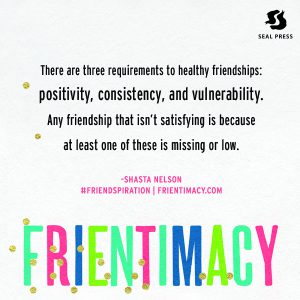We all want friendships, but most of us don't even know what that means. How Do You Define Friendship?
When I ask audiences to define the word I get things like:
- "Someone you like."
- "Someone who makes you laugh."
- "Someone who's always there for you."
- "Someone who knows the worst of you and still loves you."
- "Someone you trust."
Those all sound warm-and-fuzzy, but none of those are a definition by which we can measure a relationship with another person:
- There are a lot of people I like but who haven't become my friends.
- Plenty of people make me laugh-- some I only know via TV, does that mean we're friends?
- No one is always there for me... nor am I for them... does that mean we aren't friends?
- Yes, we want to be accepted by being loved by people who know us, but if this is our litmus test then does that mean we all have to confess our worst sins before we can be friends with someone?
- Trust? Trust them to do what??? I trust the Starbucks barista not to spit in my drink-- does that make us friends?
And the dictionary doesn't help much by basically just stating that a friendship is a "relationship between friends." ha! SO helpful!
A Definition of Friendship
I've taken the liberty to create a working definition of friendship (based on compiling/summarizing the research of many sociologists and psychologists) so we can all better identify and evaluate the qualities and actions of a friendship.
"A friendship is a mutual relationship between two people that is satisfying, safe, and where both people feel seen."
- In order for a relationship to be satisfying, it must have a foundation of positivity: While positive feelings are necessary in all healthy relationships; they are paramount to our friendships because these are the relationships we are entering by choice. We all want our friendships to add more joy, peace, and support to our lives.
- In order for a relationship to be safe, it must develop consistency: Consistency is the action of repeating our time together which in turn develops our trust as we begin to create and modify expectations of each other. The more consistency we have, the more we feel like we can anticipate how a person will behave in different situations. Consistency is what gives our new friendships momentum to get to know each other and, over time, it's what builds a shared history and increases our commitment and feeling of support in each other.
- In order for a relationship where both people feel seen, it must develop vulnerability: As we spend more consistent time together, we are also incrementally revealing and sharing more of who we are with each other. The more we let someone see us (always increasing our positivity with responses such as affirmation, acceptance, and empathy) then the more loved we'll feel for who we are.
If you don't have all three: then you don't have a healthy friendship.
And the flip side of that is equally true: if you have any friendship that isn't feeling meaningful or healthy, I can guarantee it's because at least one of these three requirements is in lack in that relationship.
In other words, if you just have positivity and consistency (fun times that are repeated often) but lack vulnerability then it's just a social group that lacks you  feeling really known and supported. Or, if you have positivity and vulnerability (a meaningful time where you felt seen and appreciated) but lack consistency so that it's not ever repeated, then it was just a really special moment with someone, but not a friendship. Or if you have consistency and vulnerability (deep sharing happening all the time) but lack positivity, then it's just a draining relationship that leaves you feeling weary. We have to have all three.
feeling really known and supported. Or, if you have positivity and vulnerability (a meaningful time where you felt seen and appreciated) but lack consistency so that it's not ever repeated, then it was just a really special moment with someone, but not a friendship. Or if you have consistency and vulnerability (deep sharing happening all the time) but lack positivity, then it's just a draining relationship that leaves you feeling weary. We have to have all three.
To that point, consider this quote I recently came across from The Atlantic:
"I’ve listened to someone as young as 14 and someone as old as 100 talk about their close friends, and [there are] three expectations of a close friend that I hear people describing and valuing across the entire life course,” says William Rawlins, the Stocker Professor of Interpersonal Communication at Ohio University. “Somebody to talk to, someone to depend on, and someone to enjoy. These expectations remain the same, but the circumstances under which they’re accomplished change.”
Did you catch the three?
- Someone to talk to (vulnerability),
- someone to depend on (consistency), and
- someone to enjoy (positivity).
Now that we have a definition we know what actions can start, build, repair, or end any friendships in our lives.
Want to know which of the 3 Requirements would make the biggest difference in your relationships? Take this quick Frientimacy Quiz!
Note: These Three Requirements are unpacked, at length, in my book Frientimacy: How to Deepen Friendships for Lifelong Health and Happiness.

